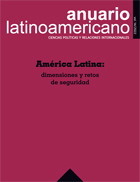Anuario Latinoamericano – Ciencias Políticas y Relaciones Internacionales
Latin American Yearbook – Political Science and International Relations
Publishing House: Wydawnictwo Naukowe Uniwersytetu Marii Curie-Sklodowskiej
Subject(s): Politics / Political Sciences, History
Frequency: 2 issues
Print ISSN: 2392-0343
Online-ISSN: 2449-8483
Status: Active
- 2022
- 2023
- 2024
- Issue No. 1/13
- Issue No. 1/14
- Issue No. 1/15
- Issue No. 1/16
Articles list
{{ article.TitleOriginalLanguage }}
{{ article.TitleOriginalLanguage }}
({{ article.TitleEnglish }})
- Publication: {{ article.Publisher }} ({{ article.Issue }})
- Author(s): {{ article.Authors }}
- Contributor(s): {{ article.Contributors }}
- Language: {{ article.Language }}
- Subject(s): {{ article.Subjects }}
- Issue: {{ article.Issue }}
- Page Range: {{ article.PageRange }}
- No. of Pages: {{ article.NumberOfPages }}
- Keywords: {{ article.Keywords }}
- Summary/Abstract: {{ article.SummaryAbstract }}
- Price: {{ common.currency(article.Price) }}
Short Description
ANUARIO LATINOAMERICANO – Ciencias Políticas y Relaciones Internacionales is a scientific peer-reviewed journal, created in 2014 by Prof. Dr. hab. Katarzyna Krzywicka and published by the Faculty of Political Science and Journalism of the Maria Curie-Skłodowska University in Lublin both in print and digitally. Anuario Latinoamericano is the first scientific journal with political science profile in the field of Latin American studies published in Poland. Anuario Latinoamericano will publish original high-quality works with an adequate theoretical and analytical framework, monographs, and comparative studies presenting novel and controversial topics, as well as book reviews and reports. The editors of the journal have set various objectives to be fulfilled by the publication: to ensure continuous contact of readers, researchers and students with current issues in the field of Latin American political studies; to integrate and deepen scientific cooperation; to promote intellectual exchange among scientists from national and foreign research centers. We hope that Anuario Latinoamericano – Ciencias Políticas y Relaciones Internacionales will be a base for scientific debates while simultaneously deepening the internationalization of our academic network of European as well as Latin American analysts from various countries.

